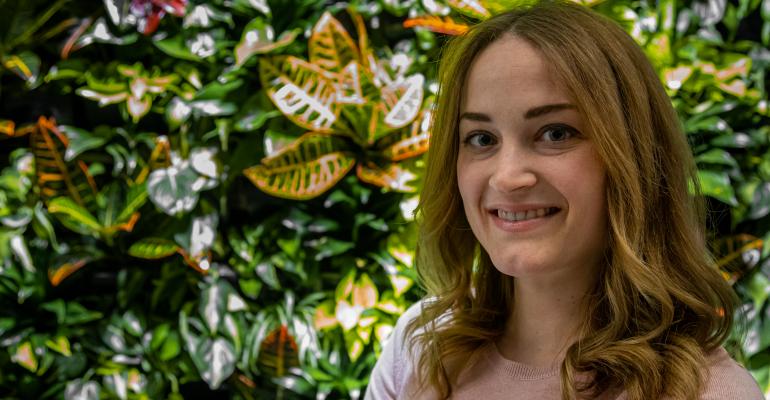With more than a decade of meetings and hospitality experience under her belt, Melissa Radu decided to go back to school to get a master’s degree in Sustainable Tourism and Regional Development at the EAE Business School in Barcelona. It was a prescient move given the direction the industry, and the planet, are going. That experience is being put to good use in her position as sustainability manager at Edmonton Economic Development Corp., overseeing programs at both the Edmonton Convention Centre (formerly the Shaw Convention Center) and the Edmonton Expo Centre. As the convention center prepares to unveil its new solar atrium, we talked to Radu about her work in Edmonton, and how the events industry is addressing sustainability issues.
MeetingsNet: What made you focus on sustainability?
Melissa Radu: I had been on sustainability committees when I was in operations, and I had the sense that we were not getting enough momentum with our best practices. We needed to really amplify the message. Doing my masters in Europe gave me a whole new perspective on the topic, for example, looking at what is happening in mature tourism destinations. Barcelona is a city of 1.6 million and has more than 20 million visitors each year. That is not sustainable.
MeetingsNet: What would you say to other meeting professionals about planning sustainable meetings?
Radu: I work in two different venues, the Edmonton Expo Centre and the Edmonton Convention Centre, and they are at two very different stages in terms of sustainability. I’ve learned that no matter where you are in the process, just having that initial conversation is the most important step. Even small changes can have a massive impact and once you have begun, you can build on each step. For example, the convention center will finish an incredible solar-panel project in April. It involved replacing 696 glass panels with integrated solar voltaic cells sandwiched between the new glass panels and will save us 230,000 kilowatt hours annually. That’s the same amount of energy used by more than 32 homes each year. But the convention center has been focused on sustainability for more than 16 years, whereas the Expo Centre and many other venues are not at that stage yet. But there are other projects that are much easier to implement. For example, we are replacing all interior lighting with LEDs over the next five years, which will cut power consumption for those lights by 50 percent.
MeetingsNet: What are you most proud of accomplishing in Edmonton and what is your next focus?
Radu: Waste management, my favorite area of sustainability! The convention center went from 50 percent waste to 14 percent waste after I came on board and instituted a new waste-management system. Eighty-six percent of all materials are recycled or reused. My goal for the future is to redesign waste management at the Edmonton Expo Centre and reduce waste from 50 percent to 80 percent.
There are three keys to a successful waste-management program:
1. Front-of-house waste-sorting program. Many attendees are international and may not understand written recycling instructions or our customs. We simplified it.
2. Back-of-house waste program. We retrained our staff to manage seven different waste streams.
3. Create partnerships for your donation programs. We work with 40 different organizations for our donations. We have donated the equivalent of 5,000 meals to the Edmonton Food Bank; a youth art program takes leftover signage; some materials go to a theater design place and they recycle them into sets; and even carpeting from booths is reused at animal shelters to make the cages comfortable.
MeetingsNet: What kind of feedback have you had from meeting planners.
Radu: Last year we launched our Responsible Meetings Program, and so far, the feedback has been very positive. One area that we have seen some pushback from North American planners is our 100 percent plant-based menu option. There is still some skepticism that delegates will like it and find it nutritionally satisfying. Part of the RMP is a communications toolkit for planners, and this has been helpful in communicating the benefits of responsible meetings and reassuring attendees about our high standards. Our chefs have done an incredible job creating an exciting and delicious menu, from the beet Wellington to more traditional items.
MeetingsNet: Is there a downside for attendees at sustainable meetings in Edmonton?
Radu: No, in fact, the atrium in the convention center will now be brighter than before the solar project because the new panels aren’t tinted. There are more than a hundred species of plants and a three-level waterfall in the atrium so it’s a living, breathing space. The solar project won’t just save us more than $200,000 a year, it will give attendees an experience in nature even in winter.





